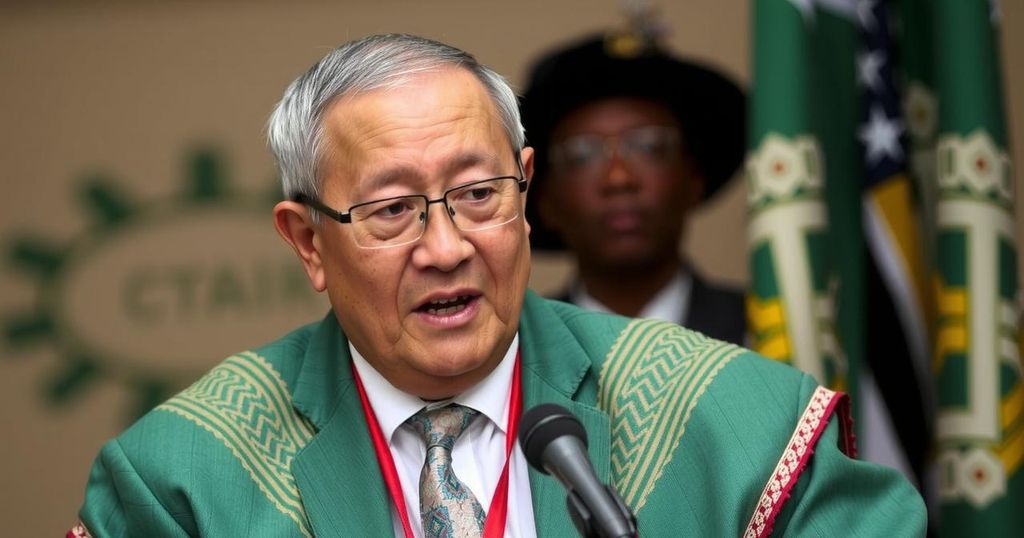UN Chief Guterres Urges Wealthy Nations to Honor Climate Finance Commitments

UN Secretary-General António Guterres has urged wealthy nations to fulfill financial commitments to help poorer countries combat climate change during his speech in Lesotho’s Parliament. He emphasized the urgency for increased aid for developing nations facing severe climate impacts, highlighted by recent droughts, and reiterated the need for permanent African representation on the U.N. Security Council.
At a recent speech to the Parliament of Lesotho, United Nations Secretary-General António Guterres called upon affluent nations to fulfill their financial commitments aimed at assisting poorer countries in combating climate change. Guterres, who is on a three-day tour of Southern Africa, emphasized the urgency for developing nations, especially in Africa, to receive substantial financial aid to address the detrimental effects of climate change, even as these nations contribute minimally to global greenhouse gas emissions.
Highlighting a recent agreement made during U.N. climate talks in Azerbaijan, Guterres pointed out that developed nations had pledged to provide at least $300 billion annually to support developing countries, a figure nonetheless falling short of the over $1 trillion requested by these countries. He remarked, “Developed countries must meet their commitments … and deliver the promised $300 billion annually for climate finance.” Guterres stressed that countries like Lesotho, which are landlocked and among the least developed, bear a disproportionate vulnerability to climate impacts.
Guterres also addressed the need for swift operationalization and generous funding of the newly established Loss and Damage Fund intended to compensate nations affected by climate-related disasters. His remarks came amid a severe drought in Southern Africa that has led to significant food shortages, affecting over 27 million individuals. The ongoing drought, partially attributed to the El Niño phenomenon, has been exacerbated by climate change, resulting in national disaster declarations in several countries, including Lesotho.
In addition to climate finance, Secretary-General Guterres reiterated his hope for Africa to gain permanent representation on the U.N. Security Council by the end of his term in December 2026. He criticized the current exclusion of Africa, which comprises over 1.4 billion people, from the decision-making body as a remnant of colonial prejudice, stating, “When a continent that is home to nearly a fifth of humanity remains systematically excluded from global decision-making, we must call this what it is, a relic of colonialism that has no place in today’s world.”
During his visit, Guterres is set to tour the Katse Dam, an essential component of the Lesotho Highlands Water Project, which aims to address water shortages by redirecting water into South Africa’s river system.
The increasing impacts of climate change are becoming exceedingly severe in Africa, despite the continent contributing minimally to global emissions. The effects are evident in the form of droughts, food insecurity, and economic losses, with African nations reportedly losing up to 5% of their GDP annually due to climate-related issues. The urgency for significant financial support from wealthier nations is underscored by recent commitments made during international climate talks, aiming to address the needs of developing countries. Furthermore, representation in global decision-making bodies has been a pressing issue, particularly regarding the U.N. Security Council where African nations remain underrepresented, reflecting historical inequities.
In conclusion, Secretary-General António Guterres has issued a compelling call for wealthy nations to uphold their financial commitments to combat climate change impacts in poorer countries, particularly in Africa. He has highlighted the detrimental effects climate change poses, particularly in Southern Africa, exacerbated by drought conditions. Guterres also emphasized the necessity of enhancing Africa’s representation in global governance, marking the current lack of permanent seats on the U.N. Security Council as a critical injustice that must be addressed.
Original Source: www.independent.co.uk






